Vegetables for Dogs: Vegetables are not only healthy for humans, but also for dogs. They can provide your canine companion with essential vitamins, minerals, antioxidants, and fiber that can support their overall health and well-being.
Table of Contents
However, not all vegetables are equally safe or beneficial for dogs, and some can even be harmful or toxic. Therefore, it is important to know which vegetables you can and cannot feed your dog, and how to prepare them properly.
Here are the 12 Vegetables for dogs
In this guide, we will cover 12 safe vegetables for dogs that you can offer as treats, snacks, or meal toppers. We will also explain the benefits and risks of each vegetable, how to serve them, and how much to give. By the end of this guide, you will have a better understanding of how to incorporate vegetables into your dog’s diet in a safe and healthy way.
Carrots
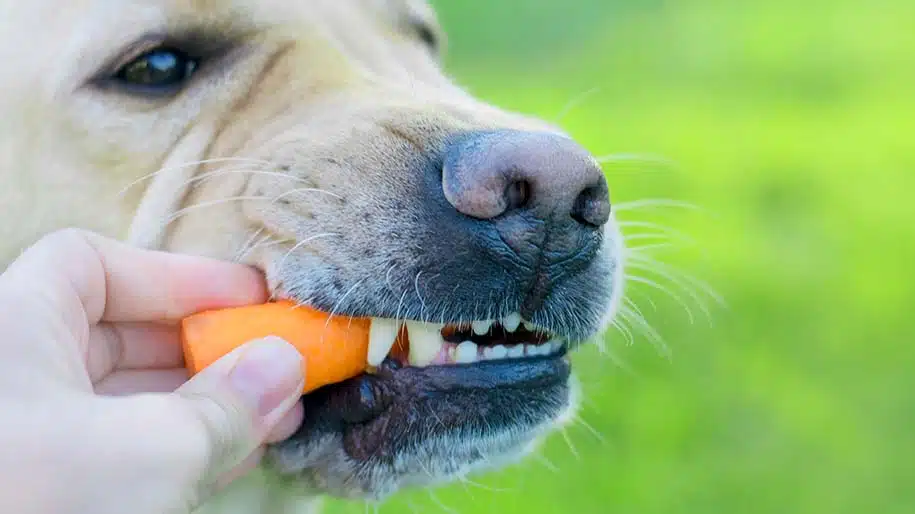
Carrots are one of the most popular vegetables for dogs, and for good reasons. They are low in calories, high in fiber, and rich in vitamin A, potassium, and beta-carotene. Carrots can help improve your dog’s vision, skin, coat, and immune system. They can also promote dental health by scraping plaque and tartar from your dog’s teeth.
Carrots can be fed raw, cooked, or frozen, depending on your dog’s preference and size. Raw carrots are crunchy and satisfying, but they can be a choking hazard for small or greedy dogs. Cooked carrots are softer and easier to digest, but they lose some of their nutrients in the process. Frozen carrots are a great option for hot days, as they can help cool down your dog and hydrate them.
Also Read: How to Feed Drools Focus Starter Super Premium to Puppy? Feeding Guide
You can give your dog whole, sliced, or grated carrots, depending on their size and chewing ability. You can also mix carrots with other vegetables or foods, or look for carrot-flavored dog treats. However, you should avoid giving your dog baby carrots, as they may contain added sugar or salt. You should also limit the amount of carrots you give your dog, as too much vitamin A can be toxic, and too much fiber can cause digestive issues.
Green Beans
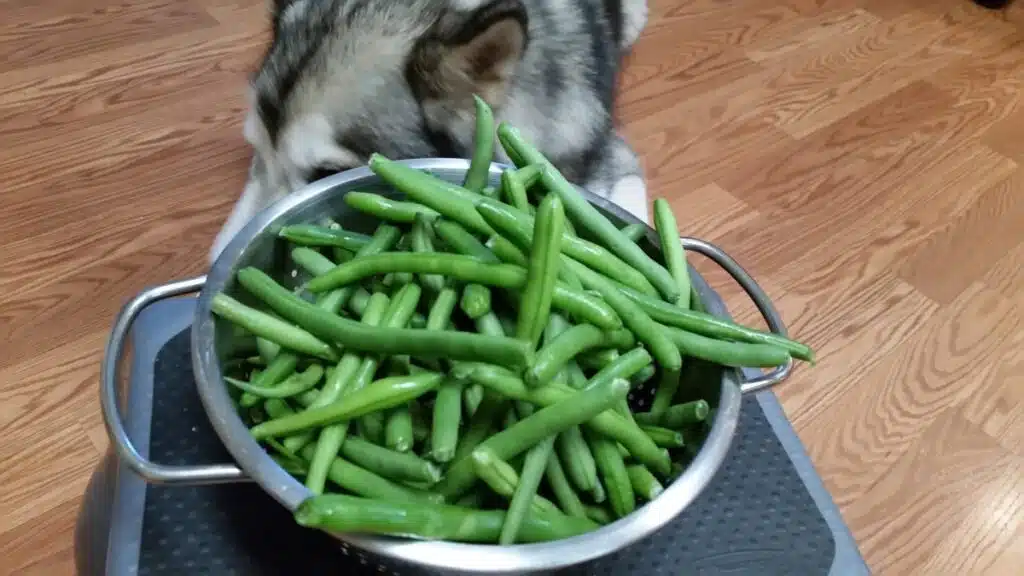
Green beans are another excellent vegetable for dogs, as they are low in fat, high in protein, and packed with vitamins and minerals. Green beans contain vitamin C, vitamin K, iron, calcium, magnesium, and manganese, among others. They can help support your dog’s bone, muscle, and blood health, as well as their metabolism and immune system.
Green beans can be fed raw, cooked, or frozen, as long as they are plain and unseasoned. You can give your dog whole, chopped, or pureed green beans, depending on their size and preference. You can also mix green beans with other foods, or look for green bean dog treats. Green beans are especially useful for dogs that need to lose weight, as they can provide a filling and low-calorie snack.
You should avoid giving your dog canned green beans, as they may contain added salt, preservatives, or other ingredients that are not good for dogs. You should also monitor the amount of green beans you give your dog, as too much can cause gas, bloating, or diarrhea.
Peas
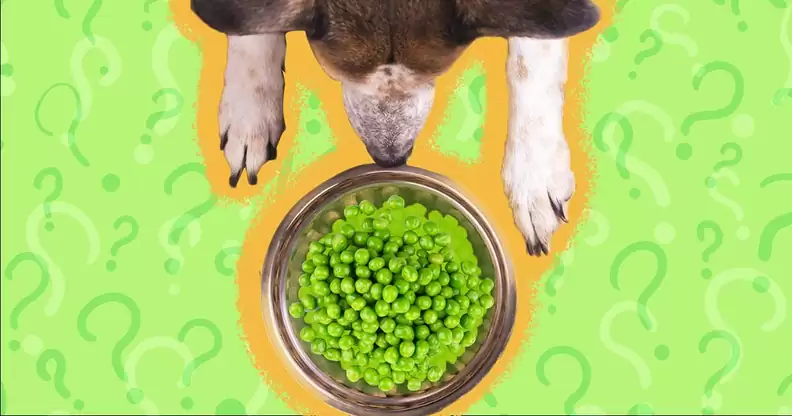
Peas are another legume that are safe and healthy for dogs. Peas are high in protein, fiber, and antioxidants, and they also contain vitamins A, B, C, and K, as well as iron, zinc, and potassium. Peas can help boost your dog’s energy, digestion, and immunity, as well as their skin and coat health.
Peas can be fed raw, cooked, or frozen, as long as they are plain and unsalted. You can give your dog whole, mashed, or pureed peas, depending on their size and preference. You can also mix peas with other foods, or look for pea dog treats. Peas are a great option for dogs that are allergic to meat, as they can provide a plant-based source of protein.
You should avoid giving your dog canned peas, as they may contain added sugar, salt, or other ingredients that are not good for dogs. You should also be careful with the type of peas you give your dog, as some varieties can be harmful. For example, you should never give your dog snow peas, sugar snap peas, or pea pods, as they can contain lectins, which are toxic for dogs. You should also limit the amount of peas you give your dog, as too much can cause digestive problems or kidney issues.
Sweet Potatoes

Sweet potatoes are a starchy vegetable that are safe and beneficial for dogs. Sweet potatoes are high in fiber, vitamin A, vitamin C, and beta-carotene. They can help improve your dog’s digestion, vision, skin, coat, and immune system. They can also provide a source of complex carbohydrates that can keep your dog full and energized.
Sweet potatoes can be fed cooked, mashed, or pureed, as long as they are plain and unseasoned. You can also give your dog sweet potato treats, such as dehydrated slices or chews. However, you should never give your dog raw sweet potatoes, as they can be hard to digest and cause intestinal blockage. You should also avoid giving your dog sweet potato skins, as they can contain solanine, which is toxic for dogs.
You should limit the amount of sweet potatoes you give your dog, as too much can cause vitamin A toxicity, which can affect your dog’s bones and joints. Too much sweet potato can also cause weight gain, diabetes, or pancreatitis, as they are high in sugar and calories.
Cucumbers

Cucumbers are a refreshing and hydrating vegetable for dogs. Cucumbers are low in calories, fat, and carbohydrates and high in water, vitamin K, and potassium. They can help quench your dog’s thirst, regulate their blood pressure, and support their kidney function. They can also help cool down your dog on hot days, and prevent dehydration.
Cucumbers can be fed raw, sliced, or diced, depending on your dog’s size and preference. You can also mix cucumbers with other foods, or look for cucumber dog treats. Cucumbers are ideal for dogs that need to lose weight, as they can provide a satisfying and low-calorie snack.
You should avoid giving your dog pickles, as they are cucumbers that have been soaked in vinegar, salt, and spices, which are not good for dogs. You should also monitor the amount of cucumbers you give your dog, as too much can cause gas, bloating, or diarrhea.
Pumpkin

Pumpkin is a seasonal vegetable that can be beneficial for dogs all year round. Pumpkin is high in fiber, vitamin A, vitamin C, and beta-carotene. It can help improve your dog’s digestion, vision, skin, coat, and immune system. It can also help with constipation, diarrhea, and anal gland issues, as it can regulate your dog’s bowel movements.
Pumpkin can be fed cooked, mashed, or pureed, as long as it is plain and unsweetened. You can also give your dog canned pumpkin, as long as it is pure and not mixed with other ingredients, such as sugar, spices, or pie filling. You can also give your dog pumpkin seeds, as long as they are roasted, unsalted, and shelled. You can also look for pumpkin dog treats, such as biscuits or chews.
You should avoid giving your dog raw pumpkin, as it can be hard to digest and cause intestinal blockage. You should also avoid giving your dog pumpkin stems, leaves, or flowers, as they can contain cucurbitacin, which is toxic for dogs. You should also limit the amount of pumpkin you give your dog, as too much can cause vitamin A toxicity, which can affect your dog’s bones and joints. Too much pumpkin can also cause weight gain, as it is high in calories.
Spinach
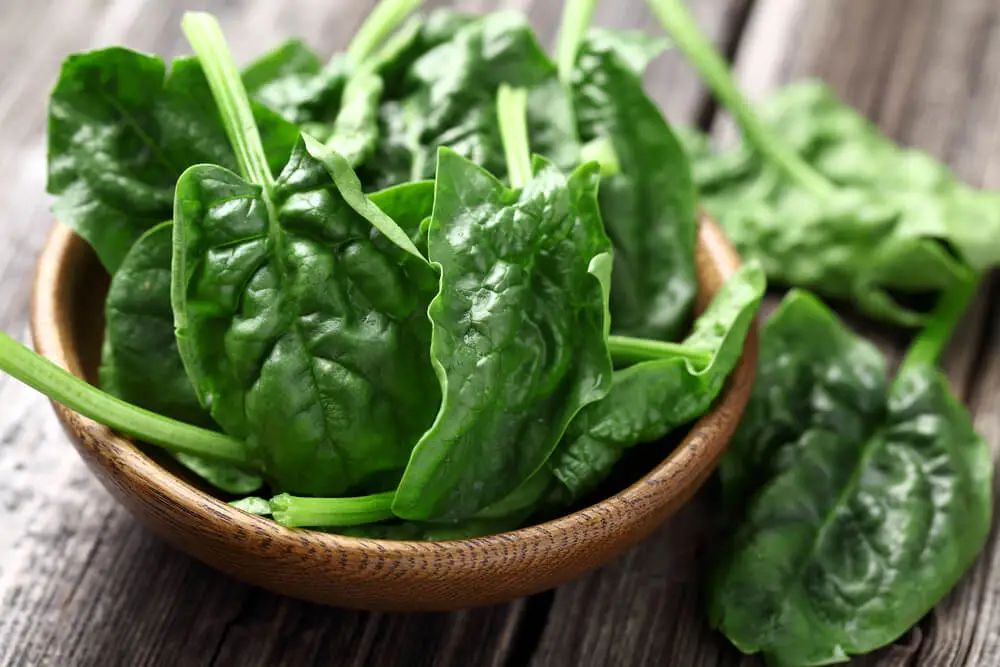
Spinach is a leafy green vegetable that can be safe and healthy for dogs in moderation. Spinach is rich in vitamins A, C, and K, as well as iron, calcium, and antioxidants. It can help support your dog’s bone, blood, and immune health, as well as their metabolism and energy levels.
Spinach can be fed raw or cooked, as long as it is plain and unseasoned. You can give your dog whole, chopped, or pureed spinach, depending on their size and preference. You can also mix spinach with other foods, or look for spinach dog treats.
You should avoid giving your dog canned or frozen spinach, as they may contain added salt, preservatives, or other ingredients that are not good for dogs. You should also be careful with the amount of spinach you give your dog, as too much can cause oxalate poisoning, which can affect your dog’s kidneys and urinary tract. Spinach also contains nitrates, which can interfere with your dog’s thyroid function.
Broccoli

Broccoli is a cruciferous vegetable that can be safe and beneficial for dogs in small amounts. Broccoli is high in vitamin C, vitamin K, and fiber, and it also contains sulforaphane, which is a compound that has anti-inflammatory and anti-cancer properties. Broccoli can help improve your dog’s digestion, immunity, and skin health, as well as prevent chronic diseases.
Broccoli can be fed raw or cooked, as long as it is plain and unseasoned. You can give your dog the florets or the stems, depending on their preference. You can also mix broccoli with other foods, or look for broccoli dog treats.
You should avoid giving your dog large amounts of broccoli, as it can cause gas, bloating, or diarrhea. Broccoli also contains isothiocyanate, which can cause gastrointestinal irritation in dogs. Therefore, you should only give your dog a small amount of broccoli as an occasional treat, and not as a regular part of their diet.
Brussels Sprouts

Brussels sprouts are another cruciferous vegetable that can be safe and nutritious for dogs in small amounts. Brussels sprouts are high in vitamin C, vitamin K, and fiber, and they also contain antioxidants and anti-inflammatory compounds. Brussels sprouts can help improve your dog’s digestion, immunity, and skin health, as well as prevent chronic diseases.
Brussels sprouts can be fed cooked or raw, as long as they are plain and unseasoned. You can give your dog whole, halved, or shredded Brussels sprouts, depending on their size and preference. You can also mix Brussels sprouts with other foods, or look for Brussels sprouts dog treats.
You should avoid giving your dog large amounts of Brussels sprouts, as they can cause gas, bloating, or diarrhea. Brussels sprouts also contain isothiocyanates, which can cause gastrointestinal irritation in dogs. Therefore, you should only give your dog a small amount of Brussels sprouts as an occasional treat, and not as a regular part of their diet.
Zucchini
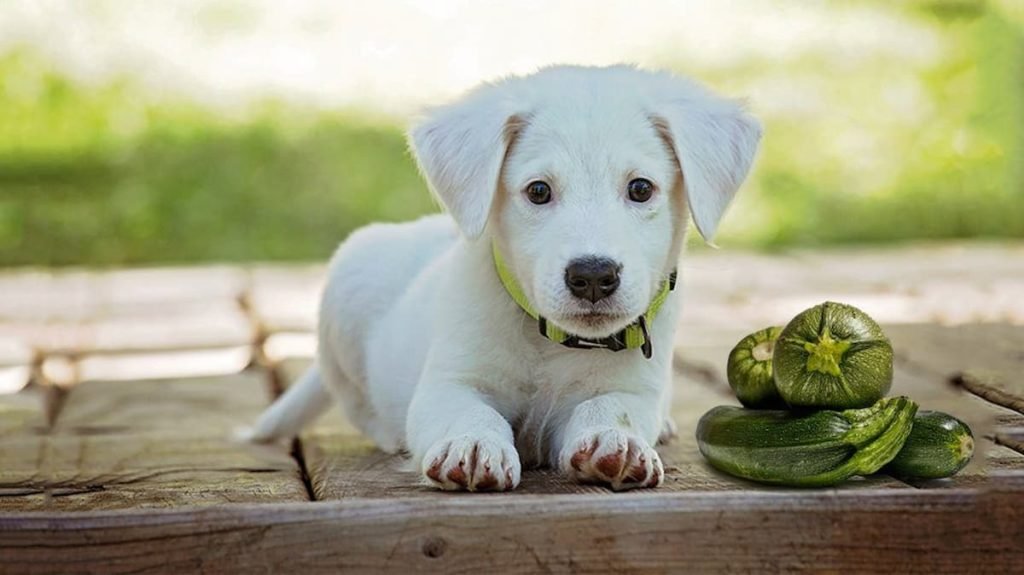
Zucchini is a summer squash that can be safe and healthy for dogs to eat. Zucchini is low in calories, fat, and carbohydrates, and high in water, vitamin C, vitamin B6, and potassium. Zucchini can help hydrate your dog, regulate their blood pressure, and support their kidney function. It can also help with weight management, as it can provide a filling and low-calorie snack.
Zucchini can be fed raw or cooked, as long as it is plain and unseasoned. You can give your dog sliced, diced, or grated zucchini, depending on their size and preference. You can also mix zucchini with other foods, or look for zucchini dog treats.
You should avoid giving your dog too much zucchini, as it can cause digestive problems or allergic reactions. Zucchini also contains oxalates, which can affect your dog’s kidneys and urinary tract. Therefore, you should only give your dog a moderate amount of zucchini as an occasional treat, and not as a regular part of their diet.
Celery
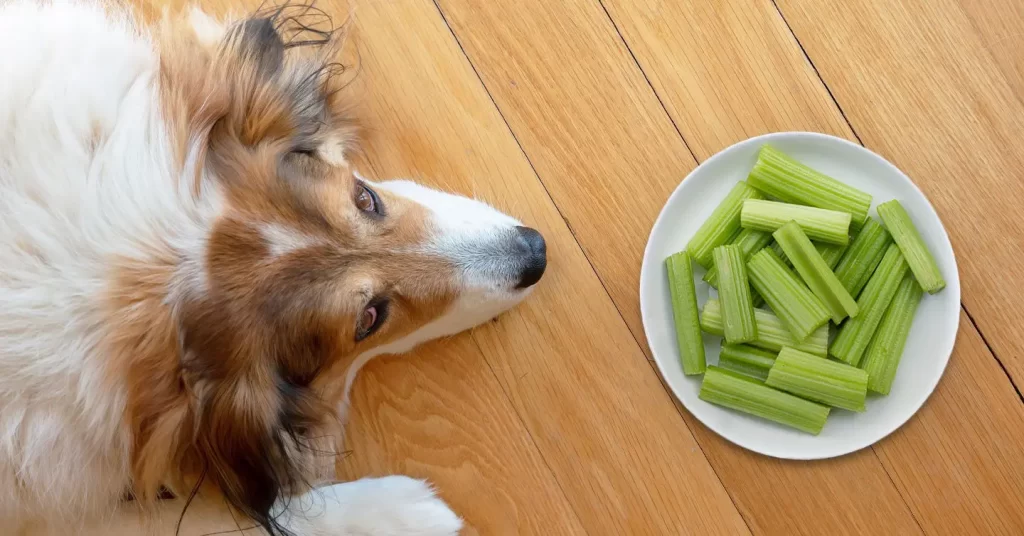
Celery is a crunchy and refreshing vegetable that can be safe and beneficial for dogs to eat. Celery is low in calories, fat, and carbohydrates, and high in water, vitamin A, vitamin C, and vitamin K. Celery can help improve your dog’s digestion, vision, skin, coat, and immune system. It can also help with dental health, as it can scrape plaque and tartar from your dog’s teeth.
Celery can be fed raw or cooked, as long as it is plain and unseasoned. You can give your dog whole, chopped, or pureed celery, depending on their size and preference. You can also mix celery with other foods, or look for celery dog treats.
You should avoid giving your dog too much celery, as it can cause gas, bloating, or diarrhea. Celery also contains nitrates, which can interfere with your dog’s thyroid function. Therefore, you should only give your dog a small amount of celery as an occasional treat, and not as a regular part of their diet.
Asparagus
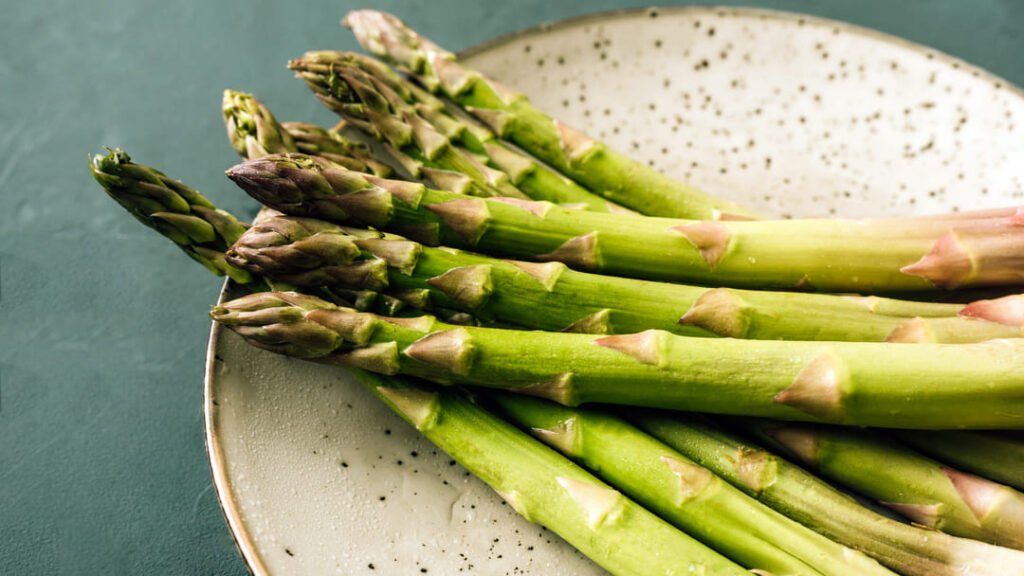
Asparagus is a spring vegetable that can be safe and healthy for dogs to eat. Asparagus is high in fiber, vitamin A, vitamin C, vitamin K, and folate. Asparagus can help improve your dog’s digestion, vision, skin, coat, and immune system. It can also help prevent urinary tract infections, as it can increase urine production and flush out bacteria.
Asparagus can be fed cooked or raw, as long as it is plain and unseasoned. You can give your dog whole, chopped, or pureed asparagus, depending on their size and preference. You can also mix asparagus with other foods, or look for asparagus dog treats.
You should avoid giving your dog too much asparagus, as it can cause gas, bloating, or diarrhea. Asparagus also contains inulin, which can cause allergic reactions in some dogs. Therefore, you should only give your dog a small amount of asparagus as an occasional treat, and not as a regular part of their diet.
What Vegetables Are Bad for Dogs?
Dogs love to munch on anything they can get their paws on, but not all veggies are good for them. Some of them are downright dangerous and can cause serious problems for your furry friend. These are the vegetables you should never feed your dog, unless you want to deal with a sick pup and a messy floor.
• Onions
• Garlic
• Leeks
These three are part of the same family, and they all contain a substance that can damage your dog’s red blood cells and cause anemia. Symptoms include weakness, lethargy, pale gums, and rapid breathing.
• Mushrooms
Some mushrooms are edible, but others are poisonous. It’s hard to tell them apart, so it’s best to avoid them altogether. Poisonous mushrooms can cause vomiting, diarrhea, seizures, liver failure, and even death.
• Corn on the cob (sweetcorn is fine but the cob is a choking hazard)
Corn kernels are fine for your dog, but the cob is not. It can get stuck in your dog’s throat or stomach and cause choking or obstruction. This can require surgery to remove.
• Tomatoes (yes we know, they’re technically a fruit)
Tomatoes contain a chemical called solanine, which is toxic to dogs in large amounts. It can cause gastrointestinal upset, tremors, seizures, and heart problems. The green parts of the tomato plant are especially dangerous.
• Rhubarb
Rhubarb leaves contain oxalic acid, which can cause kidney damage, drooling, vomiting, diarrhea, and weakness. The stalks are less toxic, but still not recommended.
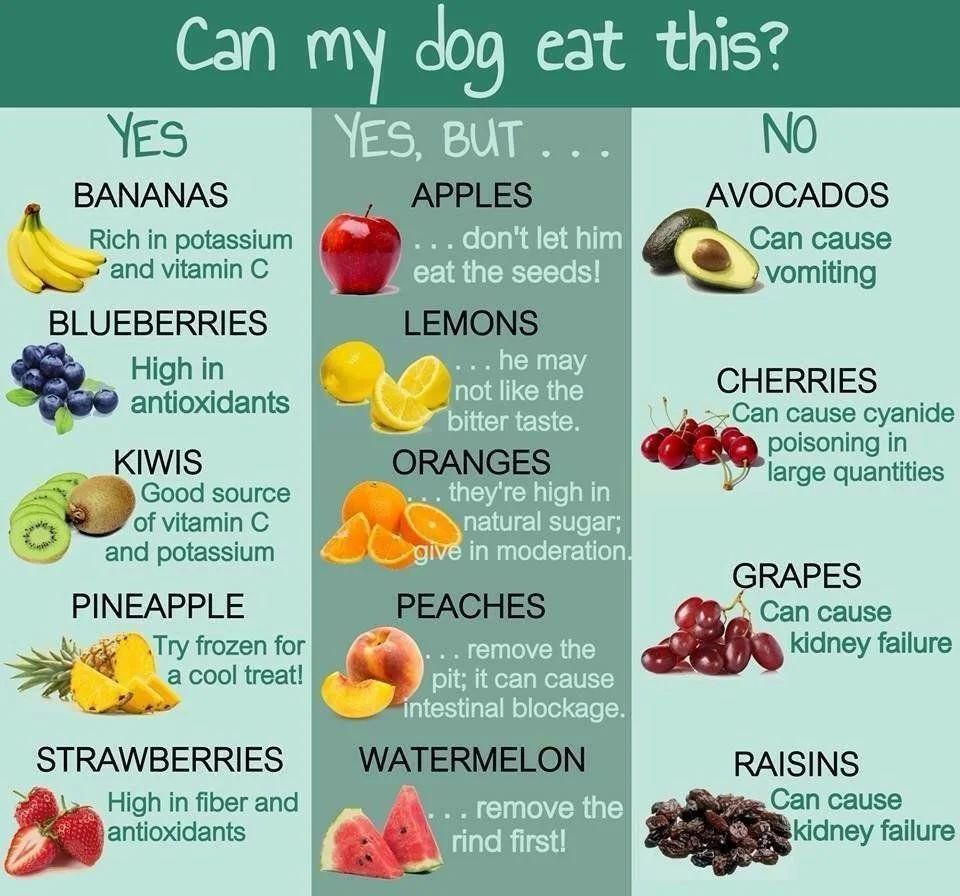
Conclusion
Vegetables can be a great way to add some variety and nutrition to your dog’s diet, as long as they are safe and suitable for dogs. However, vegetables should not replace your dog’s main food source, as they do not provide all the essential nutrients that dogs need. Therefore, you should always consult your veterinarian before introducing any new foods to your dog, and follow their recommendations on how much and how often to feed them. Remember to always wash, peel, and chop the vegetables before giving them to your dog, and avoid any seasonings, sauces, or additives that may be harmful. By following these guidelines, you can ensure that your dog enjoys the benefits of vegetables without any risks.

